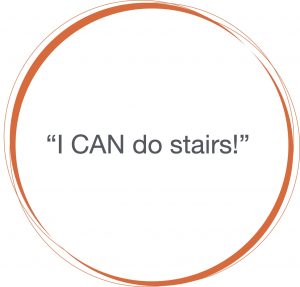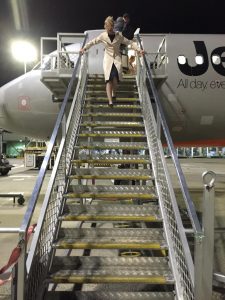 I’d forgotten how hard it is travelling with a disability. I’d forgotten that lugging my unwanted companion is an obstacle magnet.
I’d forgotten how hard it is travelling with a disability. I’d forgotten that lugging my unwanted companion is an obstacle magnet.
I write in my book –
“When I fly, I try to pre-empt the likely obstacles I may face, and almost over-plan. I know my walking frame weighs 7.6 kilograms for the check-in staff. I know that I beep when I walk through the security point, and I have figured out how to gorilla walk between the head rests down the aircraft aisle. But still each trip is a huge challenge and a steep learning curve. “ (Reinventing Emma, p 219)
Much like everyone, Covid has prevented me from spreading my wings these last few years. What I didn’t realise is that it has also limited me from encountering all the extra associated barriers.
Not merely the physical efforts, but society’s misconceptions about disability.
Today, my Covid bubble was well and truly burst -popped by another’s inappropriate attitude & actions.
I was flying to Noosa with Mum. My first holiday in four years and my experience
checking in at the airport was where it all began!
“Sorry, can you help us?” My Mum asked a Jetstar assistant who was about to serve another person.She glances at Mum, then looks at me and my walking frame. I can almost read her thoughts of how checking us in requires more effort and more time than the other passengers.
She glances around for an escape route but then seems resigned and takes our flight details and ID.Soon after we hand over our details, she wanders off with our boarding passes without a word.
“Where did she go, Em?” Mum says, her eyes and chin tracking her path.
I just shrug my shoulders and say, “I hope not too far, I need a coffee!”
After 20 minutes Mum leaves the luggage trolley with me and searches for the lady in orange. I sit on my frame and wait.
Mum returns walking ahead of the retrieved assistant lady, shaking her head and rolling her eyes.
“Where did she go Mum?” I ask
“She was organising a wheelchair and lift for you.”
“But I never asked for one!” I exclaim.
“I know” Mum says, shrugging her shoulders
The lady returns with a big grin on her face.“I couldn’t get a lift or wheelchair for you but good news,”she pats my shoulder condescendingly, “I moved your seat from 13D to 3C to save you the walk.”
“Thank you,” I say, “but I didn’t ask for a lift or wheelchair!”
It’s so hard to be grateful for someone’s efforts and not irritated by their assumptions in situations such as this.
“Oh, how can you get up the stairs though?” she asks monotonously
“I can do stairs!” I exclaim.
I feel like this conversation is da-ja-vu from flights years ago. I even wrote about one of them in my book.
“Later in the flight, the attendant crouches down next to me in the aisle and says, “We’ll be exiting this aircraft via the tarmac, would you like the special lift down?”
I have travelled once in that dodgy, terrifying cherry-picker-like lift machine and immediately reply, “No thanks, I can do stairs.”
She nods.
We land. Once the seat-belt sign is off, my fellow passengers are on their digital devices and with the click of their belts, are released to resume life again.
I sit and watch them, my belt still fastened. I know from flights past that I’ll depart with the staff and meet the cleaners on their way in.
“Sorry about the long wait, Ma’am. We had to wait for the special lift,” the same attendant says.
“But I didn’t ask for the lift. I can do stairs. I’d prefer stairs.”
But the lift has been organised, as has a wheelchair. So I swallow my fear and frustration, plonk into the chair and take the dreaded lift.
(Reinventing Emma, p 223)
So you can see why it’s frustrating that I need to have the same conversation years later. But I also know that I need to ‘choose my battles’ and recuperate. I have learned from those difficult times to not let these obstacles negatively taint my holiday. So, with our luggage checked in, Mum & I get to the cafe to recover and fuel for the long, long hike to the gate.
“Wow, that was ridiculous!” Mum says, sipping her coffee.
“I wish she’d have just asked!” I slurp from my straw.
Coffee fuelled, we embark on our hike to the last gate.
“Crazy but the gate we are boarding fromis the last gate in the airport. Pity she didn’t spend that 20 minutes organising a buggy to take us there!” I say, exhausted, trying to walk quickly past the empty assistant desk.
It’s easy to assume what another needs & feel proud that we’ve preempted those needs. But we really need to consider that our efforts maybe hindering both their ability to participate in an experience and the effect relationship we can develop with them.
If another is already compromised, by assuming their needs and perhaps setting up more supports, are you inadvertently implying that they can’t do something?
True inclusion isn’t about making assumptions or finding a “one size fits all approach” to disability. It’s about providing equitable access to people who need it and making accommodations based on their own individual needs. But in order to do this, you need to find out what those needs are first.
Assuming someone needs a lift or wheelchair without asking, isn’t finding out their needs and providing them with equitable access. It’s making a judgement based on your perception of them without actually communicating with them at all.
How can you change your perceptions to enable another?